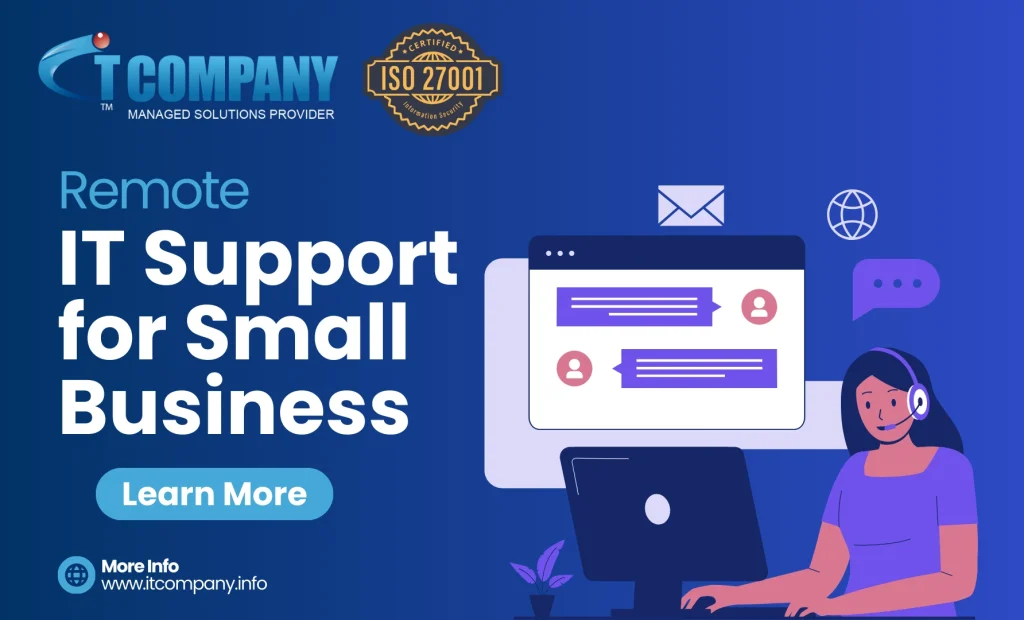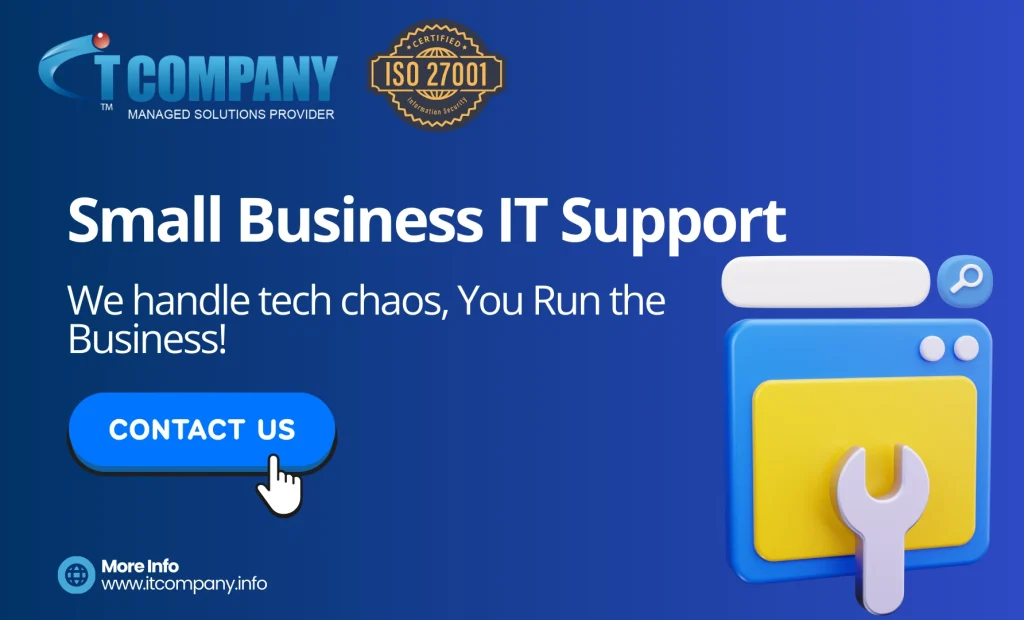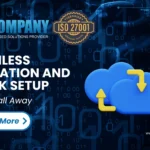
In today’s tech-driven world, remote IT support for small businesses in and is absolute necessity. Because they lack resources and expertise to overcome the problems by its own. IT Company offers remote IT support with expert assistance for troubleshooting, cybersecurity, and system maintenance – all without the need for on-site visits.
This blog will introduce you to the basics of remote IT support. So that you can stay efficient, and secure at least cost.
Table of Contents
ToggleWhat is Remote IT Support?
Remote IT Support provides assistance to troubleshoot and resolve technical issues from remote. Technical experts use different remote software to get assess to your system and fix all issues and update it accordingly.
If a small business employee encounters a software glitch, via remote connection IT experts not only diagnose the problem. They fix and guide the end user without consuming there in person visit time.
| Description | Remote IT Support | Traditional In-House IT Support |
| Accessibility | Accessible from anywhere, instant support available | Requires technicians to be on-site, potentially delaying response times |
| Cost | Generally lower costs, no need for full-time staff | Higher costs due to salaries, benefits, and training expenses |
| Scalability | Easily scalable to meet changing business needs | May require hiring additional staff or reallocating resources |
| Expertise | Access to a wider pool of specialized technicians | Limited expertise based on the existing in-house team |
7 Steps to Remote IT Support Road Map
Step 1: Issue Identification
Companies and organizations face technical issues on daily basis (e.g. software malfunction, poor configuration, network problem). In that case connect Remote IT support providers.
Step 2: Support Request
Submit technical support via email, chat bot or helpdesk ticket support. Submit your issues and ask for remote access if necessary.
Step 3: Remote Connection
The IT technician connects to the user’s computer or network via remote desktop software. This allows them to control the device as if they were physically present.
Step 4: Diagnosis
Diagnosis: The technician performs diagnostics, checking system logs, running tests, or observing the issue in real-time to identify the root cause.
Step 5: Troubleshooting & Resolution
The technician implements the necessary fixes—whether it’s adjusting settings, reinstalling software, or repairing system configurations—directly through the remote connection.
Step 6: Confirmation & Follow-up
After resolving the issue, experts test the system to confirm the problem is fixed. They may also follow up with the user to ensure everything is running smoothly.
Step 7: Documentation
The entire process is usually documented in a support ticket for future reference or ongoing monitoring.
Challenges Small Companie Face Without Dedicated IT Support
- Frequent Downtime: Without dedicated managed IT support, technical issues can take longer time to resolve, leading to frequent and prolonged downtime, which reduces productivity.
- Cybersecurity Vulnerabilities: Cyber security measures like installation of firewalls, antivirus software and its compatibility with existing setup, security updates and compliances are the list of few things that small businesses have always required.
- Inefficient Technology Management: Without IT expertise, small businesses may struggle with outdated software, improper network setups, and slow system performance. There is real time struggle when dealing with outdated software problems, improper network setups and slow system performance which can jeopardize the whole setup and infrastructure of any organization whether it is small or large.
- Lack of Technical Expertise: Without technical assistance troubleshooting is a threat itself, as it is inefficient, misconfiguration and causing more harm than fixing the problem.
Remote IT Support on a Budget
- Lower Overhead Costs: Remote IT support eliminates the need to hire full-time in-house IT staff, significantly reducing payroll, benefits, and office space expenses.
- Pay-as-You-Go Services: Many remote IT providers offer flexible, pay-as-you-go or subscription-based pricing models, allowing small businesses to only pay for services they need.
- Proactive Monitoring: Remote IT support often includes proactive system monitoring to detect potential issues before they become major problems, saving time and money on emergency repairs.
- Scalable Solutions: As a small business grows, remote IT support can easily scale up or down, allowing businesses to manage their technology needs without overspending.

Example: Remote IT Support for and -Based Enterprises
- Network Connectivity Issues: Enterprises experience slow or interrupted internet service which needs network diagnosing and optimization and remote support avoid fixed downtime and ensure smooth operations.
- Software Installation and Configuration: Employers struggle with setting up new software, while remote support can access the system, install the necessary requirements and configure them to be compatible with existing network and system.
- Virus or Malware Removal: If a small business is hit by malware, a remote IT provider can quickly run diagnostics, remove the malware, and implement stronger security measures to prevent future attacks.
- Cloud Backup and Data Recovery: In the case of data loss, remote IT support can retrieve lost files from cloud backups, ensuring business continuity without major data recovery costs or on-site intervention.
- System Updates and Patches: Distant IT Support via ticket can manage system updates and patch installations to ensure that software stays up to date and secure, avoiding performance slowdowns or security risks.
Why Remote IT Services in and is Required
Remote IT services in and are essential for businesses seeking cost-effective, 24/7 support without the need for in-house team. IT Company ensures fast troubleshooting, enhanced security, and even system maintenance all across and . With our remote services, business can stay operation as we minimize downtime and in return it enhances productivity. We offer following services in and .
- Technical Troubleshooting: Fixing common issues like software crashes.
- Cybersecurity: Protecting business data, installing firewalls, and monitoring threats remotely.
- Cloud Support: Managing cloud services, data backup, and storage solutions.
- Software Installation & Updates: Keeping business software up to date and functioning.
- Network Management: Ensuring stable internet and network connections.
- Disaster Recovery: Remote assistance for data recovery, system restoration and hacked website repair.
Conclusion
IT Company in and offers businesses a flexible and efficient solution to manage their infrastructure optimally. Improve performance without high costs associated with in-house team expense. Use continuous support, quick troubleshooting and expert advice which are the accessible to any organizations via remote IT support.
Remote IT support ensures faster response time, improved cybersecurity, and the ability to scale as your business grow. Whether you are managing daily operations or addressing critical issues, remote IT support empower business to focus on core activities while minimizing potential disruptions. It’s an indispensable tool for modern businesses seeking growth and increasing investment opportunity!
Frequently Asked Questions




